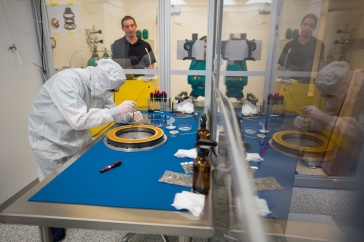
Small Family Community Fellowship recipient Marc Giudice ’23 spent his summer working?with Indonesia Community Connect, Inc. based in Somersworth.
The cheer “I believe in UNH” can often be heard across Durham’s campus – from packs of students in the stands at Wildcat Stadium or groups of alumni gathering next to Thompson Hall during reunions. It’s a sentiment held in the hearts of UNH’s most fervent supporters — like John W. Small '76, who is working to ensure that all of New Hampshire believes in its flagship university.
From serving on the University System of New Hampshire?board of trustees, including as its chairman for two years, to leading the search for UNH President James W. Dean Jr. to volunteering for various committees, Small has worked to advance the financial and operational effectiveness of UNH and USNH.
His latest effort? Establishing the Small Family Community Fellowship, which provides opportunities for New Hampshire students to apply what they learn in the classroom to important needs at the local level.
“I decided to make a significant donation for a fund that aligns with President Dean’s strategic priority to embrace New Hampshire, because I believe that we need to continue to help New Hampshire students, residents and legislators better understand just what a gem we have in UNH,” Small says.
Through paid positions with community organizations and businesses, these fellowships combine students’ academic pathways with service to enhance both student growth and the common good.
“Way too many New Hampshire high school students choose to study at out-of-state schools, and my hope is to help attract and retain more granite staters for UNH,” he says.
Meet the Inaugural Fellows
The first four fellows embarked on exciting learning opportunities during the summer of 2021.
Katherine Salvatore ’21 ’22G spent her summer working with Revolution Energy to research resilient and renewable energies in islanded communities in New Hampshire and Maine through a collaborative project with the UNH School of Marine Science and Ocean Engineering, the UNH Department of Natural Resources and the Environment and UNH Cooperative Extension.
  |
| Katherine Salvatore ’21 traveled to island communities, like Monhegan in Maine, to research resilient and renewable energies. (Charlie French photo) |
Revolution Energy helps communities design and implement renewable energy projects. Salvatore’s research involved islanded communities like Monhegan in Maine, as well as “figuratively islanded” communities in northern New Hampshire.
Salvatore graduated with a bachelor’s in chemical engineering and minor in anthropology; she is continuing at UNH this fall in an accelerated master’s program for chemical engineering. In addition to researching case studies and technology and modeling software, Salvatore visited communities and spoke with residents.
“It was so informative to have direct conversations with the people who are trying to implement change and to have a chance to explore the islands and talk to members of the communities,” she says. “This experience has given me important skills that will help my career as well as a great opportunity to directly help people.”
Salvatore’s background in anthropology has helped her realize that, beyond the hard science of data analytics, this kind of work requires interpersonal skills. “I hope that in the intersection of cultural and scientific understanding, I can help create lasting and effective change,” she says.
Marc Giudice ’23, a political science and international affairs dual major, embarked on a marketing and administrative internship with Indonesia Community Connect, Inc. (ICC), based in Somersworth.
ICC serves as a bridge that connects Indonesian culture with communities in the surrounding area. Through events, programs and networking, the nonprofit establishes access to resources, facilitates mutual understanding among different cultures and values and promotes the richness of Indonesian cultural diversity.
Giudice gave tours of the cultural center, communicated with business partners and undertook tasks like monthly email marketing, website updates, fundraising and point of sale operations for their gift shop. He met with mayors, mayoral candidates and even Governor Sununu.
Calling it a first-in-the-world project of its kind, Giudice emphasizes the importance of organizations like the ICC, especially during a time when hateful anti-Asian rhetoric has been an increasingly visible issue.
“It generates a sense of pride and helps ensure that people don’t lose a sense of self in the melting pot of the U.S,” he says.
Meanwhile, over at Camp Foster in Bedford, biological sciences students Madison McLaughlin ’22 and Melanie Stahley ’22 spent their summer as science teaching fellows with the Manchester Boys and Girls Club. The pair co-facilitated outdoor science activities with K-8 students.
  |
| Melanie Stahley '22 and Madison McLaughlin '22.? (Photo by Cameron Schuyler ’22) |
McLaughlin and Stahley, who study at UNH at Manchester, enjoyed incorporating lessons about physics into races with matchbox cars and discussing aerodynamics when making paper airplanes with the students.
Working at Camp Foster gave Stahley insight into what it would take to become a science teacher.? “You have to have a drive for science and be really patient … it just opens up my eyes to what I would have to do in the future if I were to do this for a profession,” she says.
Says McLaughlin: “We incorporate science to show the kids what it’s like and spark some of their interest. They enjoy it and want to learn more. I love to hear their questions — ‘how does this happen?’ and ‘how does it work?’ They have the passion and the drive to learn more. I was once at that stage and they can be where I’m at one day, too.”
-
Written By:
Emma Joyce | UNH Cooperative Extension | emma.joyce@unh.edu | 603-862-1814



















































